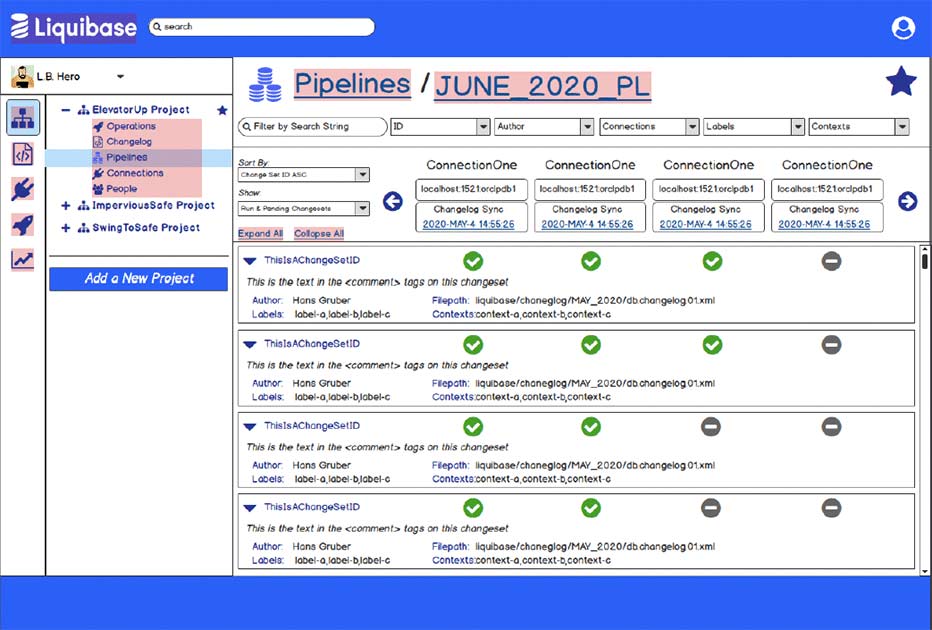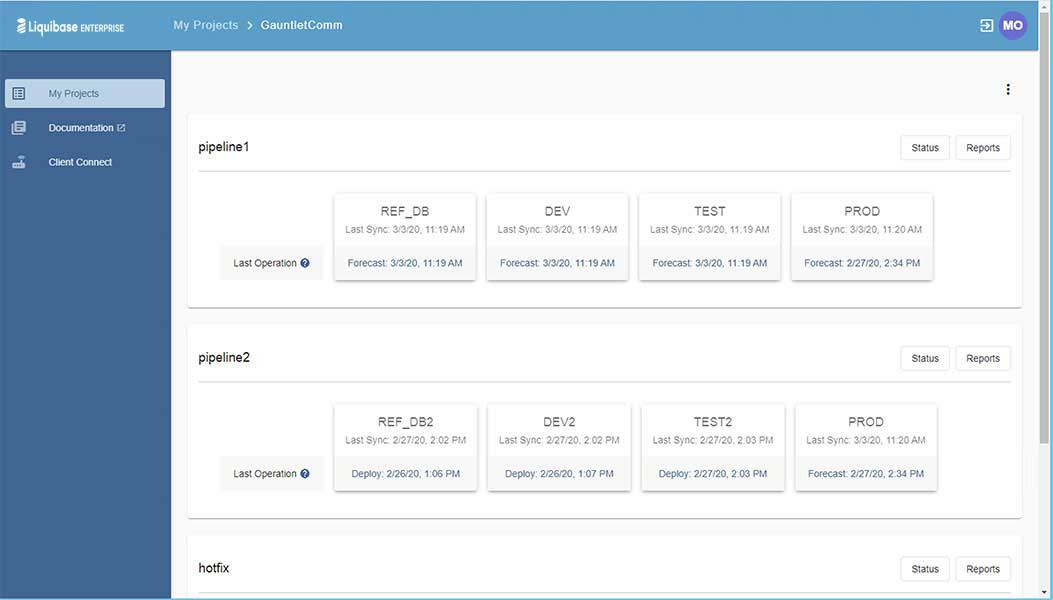Datical Rebrands, Refashions Offerings to Promote Broader Access to Database Release Automation
Datical is doubling down on ways to help companies adopt database release automation as part of DevOps workflows and best practices. IDN talks with CTO Robert Reeves about their expanded portfolio, more open source options and a company name change to Liquibase.
by Vance McCarthy
Tags: application, automation, Datical, DevOps, Liquibase, open source,

CTO

"Our expanded portfolio is all about meeting the needs of customers, wherever they are right now in their DevOps journey."
 Modern Application Development for Digital Business Success
Modern Application Development for Digital Business SuccessDatical, a provider of database release automation software, is broadening its portfolio to give companies more choice in tools and capabilities to support their DevOps journey.
To underscore the shift, Datical is now Liquibase. This name change reflects the company’s increased focus on providing DevOps-optimized open source software.
[Datical purchased Liquibase almost a decade ago. Since then has become popular among developers for database version control thanks to its open-source database-independent library for tracking, managing and applying database schema changes.]
Further, the renamed company will broaden open source and commercial options to help DevOps teams identify and solve many hard-to-handle database issues that can stall progress.
“Our expanded portfolio is all about meeting the needs of customers, wherever they are right now in their DevOps journey,” Liquibase CTO Robert Reeves told IDN. “We’ve learned over the years that not everybody is at the same place at the same time. So we’ve got your back because we have a range of open source and commercial products and technologies.
The remodeled Liquibase portfolio consists of 4 distinct offerings designed to span all levels of requirements for DevOps and CI/CD projects.
“We’ve learned [delivering DevOps and CI/CD projects] are not one-size-fits-all. Proposition when it comes to tools. So, today, the opportunity is to offer a progression of products from open source to [commercial] enterprise products,” Reeves said.
“If they’re just starting out, and haven’t even begun to automate their app deployments, users will find a lot of value in open source and the Liquibase open source software and community.”
Companies further along their DevOps journey “will find lots of value in the ways we help with automation and management of database tasks,” he added.

The new Liquibase product portfolio consists of:
Liquibase Enterprise (formerly Datical DB) helps enterprises and businesses in regulated industries conduct fast, safe database deployments that make it easy to enforce governance and stay compliant.
Liquibase Business provides enhanced visibility into all code changes across the pipeline to improve team workflows and maximize business impact.
Liquibase Pro empowers developers with advanced features for database schema changes, allowing them to evolve their database quickly and reliably.
Liquibase Community is a free offering that lets developers explore and get familiar with database schema change management and bringing the database under version control.
Liquibase's focus on flexibility by offering a range of tools is also reflected in how users can adopt and deploy solutions. Users can
Embed Liquibase directly into a product to automatically deploy on app startup
Embed Liquibase into popular build tools, such as Jenkins, Ant, Maven, and Gradl
Use Liquibase to generate the SQL that DBAs want to run. Liquibase supports an updateSQL mode in the command line, as well as in Ant and Maven interfaces.
Liquibase Delivers Automation and Visibility for DevOps
The Liquibase name change underscores the value the company puts in the leveraging open source software’s model for community and collaboration.
“Our name change reflects a fundamental pivot in building value for our customers, partners and communities,” said Liquibase CEO Dion Cornett in a statement.
“We believe in open source collaboration and are realigning our product development efforts around community-driven innovation. This means being both a good steward of our community and a trusted enterprise vendor. Our customers and community are already benefiting from a broader array of supported databases, enhanced ease of use, and faster time to value across a more flexible range of solutions,” Cornett added.
Aside from doubling down on open source software and community, Liquibase offers DevOps-focused database assistance in two key areas: automation and visibility for diverse teams.
“Not every customer in the enterprise stands up every capability out of the gate, Reeves said. “So we took a page out of that best practice. We aim to provide good user documentation that requires minimal assistance.”
The best ways to do that, he added are
- Automate where possible and
- Meet unmet needs for visibility

Automation
The Liquibase approach to database automation lets users keep in sync hundreds of databases deployments and easily reproduce full databases as and when required with little effort, according to the website.
"We know without automation, CI/CD will fail at the database. We’ve also learned this is not a 1-size fits all, so the opportunity is a progression of products from open source to the enterprise,” Reeves told IDN.
Visibility
Another driver is to bring more visibility of database impacts to all DevOps teams and stakeholders.
“One of the biggest things we learned is many teams need a way to support and work with developers who don’t live in the database,” Reeves said. “So Liquibase provides help with structuring changes and allowing for collaborative write capabilities. “We know from real-world experience that specific features like that make it faster for companies to get up and running with DevOps.”
One example of delivering visibility to teams is Liquibase Hub.
Pete Pickerill, Liquibase co-founder, detailed in a blog post how Liquibase Hub lets team members “get more information, quickly” via its centralized API-driven visibility into database change and deployment efforts.
We want Liquibase Hub to make it ridiculously easy to organize, monitor, and visualize your Liquibase activity. We think it’ll be important for you to view your data in multiple contexts.
Here are some examples of what we mean:
Track updates and rollbacks across database connections and changelogs
- View which database connections a changelog has been applied to
- Determine which changesets have been run on a single database
- See the differences between two databases
- See individual database connection information, such as
- Which changelogs have been used to update a database connection?
- Which operations are associated with the database connection?
- Get a comparative status view across several databases within a project or pipeline
“Liquibase is patterned after deployment patterns and customers. Not every customer on the enterprise stands up every capability out of the gate. So we took a page out of that best practice. Minimal assistance and good user documentation,” Reeves added.
One analyst gave a positive review of Liquibase’s moves to make DevOps more accessible.
Stephen O'Grady, principal analyst with RedMonk, said, "Even as DevOps has dramatically transformed the process of application development and accelerated time to market, too often those responsible for database management are stuck with important but tedious tasks like the manual update of schemas. This has created a market opportunity to automate the process, so that database code can be treated like application code, improving the overall velocity of delivery. This opportunity is, in essence, what Liquibase was built for."
Related:
- InfluxData's Latest Updates Optimize Time Series Data for Better Performance, Scale and Management
- Actian Zen 16.0 Update Simplifies Delivery and Boosts Performance of Edge, IoT Apps
- Virtana Infrastructure Performance Management Adds AI-driven Capacity Planning
- e2open’s Supply Chain SaaS Updates Help Firms Reduce Operational Risks with Deeper Visibility
- Report: Endor Labs Identifies 2023 Operational, Security Risks To Open Source
All rights reserved © 2025 Enterprise Integration News, Inc.


